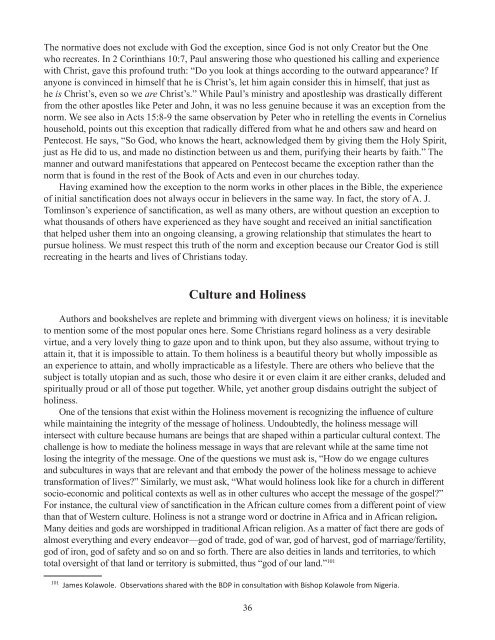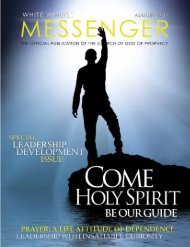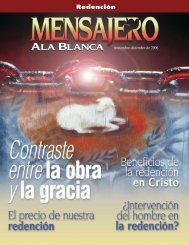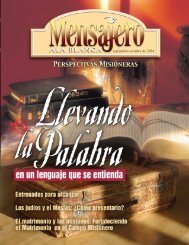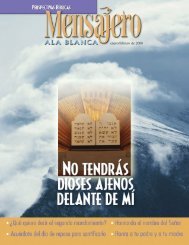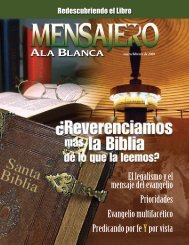The Pursuit of the Holy God - Church of God of Prophecy
The Pursuit of the Holy God - Church of God of Prophecy
The Pursuit of the Holy God - Church of God of Prophecy
You also want an ePaper? Increase the reach of your titles
YUMPU automatically turns print PDFs into web optimized ePapers that Google loves.
<strong>The</strong> normative does not exclude with <strong>God</strong> <strong>the</strong> exception, since <strong>God</strong> is not only Creator but <strong>the</strong> One<br />
who recreates. In 2 Corinthians 10:7, Paul answering those who questioned his calling and experience<br />
with Christ, gave this pr<strong>of</strong>ound truth: “Do you look at things according to <strong>the</strong> outward appearance? If<br />
anyone is convinced in himself that he is Christ’s, let him again consider this in himself, that just as<br />
he is Christ’s, even so we are Christ’s.” While Paul’s ministry and apostleship was drastically different<br />
from <strong>the</strong> o<strong>the</strong>r apostles like Peter and John, it was no less genuine because it was an exception from <strong>the</strong><br />
norm. We see also in Acts 15:8-9 <strong>the</strong> same observation by Peter who in retelling <strong>the</strong> events in Cornelius<br />
household, points out this exception that radically differed from what he and o<strong>the</strong>rs saw and heard on<br />
Pentecost. He says, “So <strong>God</strong>, who knows <strong>the</strong> heart, acknowledged <strong>the</strong>m by giving <strong>the</strong>m <strong>the</strong> <strong>Holy</strong> Spirit,<br />
just as He did to us, and made no distinction between us and <strong>the</strong>m, purifying <strong>the</strong>ir hearts by faith.” <strong>The</strong><br />
manner and outward manifestations that appeared on Pentecost became <strong>the</strong> exception ra<strong>the</strong>r than <strong>the</strong><br />
norm that is found in <strong>the</strong> rest <strong>of</strong> <strong>the</strong> Book <strong>of</strong> Acts and even in our churches today.<br />
Having examined how <strong>the</strong> exception to <strong>the</strong> norm works in o<strong>the</strong>r places in <strong>the</strong> Bible, <strong>the</strong> experience<br />
<strong>of</strong> initial sanctification does not always occur in believers in <strong>the</strong> same way. In fact, <strong>the</strong> story <strong>of</strong> A. J.<br />
Tomlinson’s experience <strong>of</strong> sanctification, as well as many o<strong>the</strong>rs, are without question an exception to<br />
what thousands <strong>of</strong> o<strong>the</strong>rs have experienced as <strong>the</strong>y have sought and received an initial sanctification<br />
that helped usher <strong>the</strong>m into an ongoing cleansing, a growing relationship that stimulates <strong>the</strong> heart to<br />
pursue holiness. We must respect this truth <strong>of</strong> <strong>the</strong> norm and exception because our Creator <strong>God</strong> is still<br />
recreating in <strong>the</strong> hearts and lives <strong>of</strong> Christians today.<br />
Culture and Holiness<br />
Authors and bookshelves are replete and brimming with divergent views on holiness; it is inevitable<br />
to mention some <strong>of</strong> <strong>the</strong> most popular ones here. Some Christians regard holiness as a very desirable<br />
virtue, and a very lovely thing to gaze upon and to think upon, but <strong>the</strong>y also assume, without trying to<br />
attain it, that it is impossible to attain. To <strong>the</strong>m holiness is a beautiful <strong>the</strong>ory but wholly impossible as<br />
an experience to attain, and wholly impracticable as a lifestyle. <strong>The</strong>re are o<strong>the</strong>rs who believe that <strong>the</strong><br />
subject is totally utopian and as such, those who desire it or even claim it are ei<strong>the</strong>r cranks, deluded and<br />
spiritually proud or all <strong>of</strong> those put toge<strong>the</strong>r. While, yet ano<strong>the</strong>r group disdains outright <strong>the</strong> subject <strong>of</strong><br />
holiness.<br />
One <strong>of</strong> <strong>the</strong> tensions that exist within <strong>the</strong> Holiness movement is recognizing <strong>the</strong> influence <strong>of</strong> culture<br />
while maintaining <strong>the</strong> integrity <strong>of</strong> <strong>the</strong> message <strong>of</strong> holiness. Undoubtedly, <strong>the</strong> holiness message will<br />
intersect with culture because humans are beings that are shaped within a particular cultural context. <strong>The</strong><br />
challenge is how to mediate <strong>the</strong> holiness message in ways that are relevant while at <strong>the</strong> same time not<br />
losing <strong>the</strong> integrity <strong>of</strong> <strong>the</strong> message. One <strong>of</strong> <strong>the</strong> questions we must ask is, “How do we engage cultures<br />
and subcultures in ways that are relevant and that embody <strong>the</strong> power <strong>of</strong> <strong>the</strong> holiness message to achieve<br />
transformation <strong>of</strong> lives?” Similarly, we must ask, “What would holiness look like for a church in different<br />
socio-economic and political contexts as well as in o<strong>the</strong>r cultures who accept <strong>the</strong> message <strong>of</strong> <strong>the</strong> gospel?”<br />
For instance, <strong>the</strong> cultural view <strong>of</strong> sanctification in <strong>the</strong> African culture comes from a different point <strong>of</strong> view<br />
than that <strong>of</strong> Western culture. Holiness is not a strange word or doctrine in Africa and in African religion.<br />
Many deities and gods are worshipped in traditional African religion. As a matter <strong>of</strong> fact <strong>the</strong>re are gods <strong>of</strong><br />
almost everything and every endeavor—god <strong>of</strong> trade, god <strong>of</strong> war, god <strong>of</strong> harvest, god <strong>of</strong> marriage/fertility,<br />
god <strong>of</strong> iron, god <strong>of</strong> safety and so on and so forth. <strong>The</strong>re are also deities in lands and territories, to which<br />
total oversight <strong>of</strong> that land or territory is submitted, thus “god <strong>of</strong> our land.” 101<br />
101 James Kolawole. Observations shared with <strong>the</strong> BDP in consultation with Bishop Kolawole from Nigeria.<br />
36


